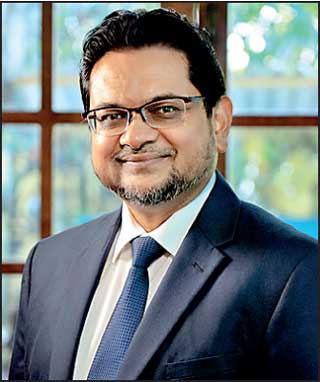Wednesday Feb 18, 2026
Wednesday Feb 18, 2026
Thursday, 20 June 2024 00:28 - - {{hitsCtrl.values.hits}}
 |
| Verité Research Executive Director Dr. Nishan de Mel
|
Verité Research Executive Director Dr. Nishan de Mel yesterday opined that the International Monetary Fund (IMF) has become a part of a problem rather than a solution in Sri Lanka.
He made this observation in a post on ‘X’ concerning the proposed Imputed Rental Income Tax which he claimed has serious problems. “It has no known analytical basis for its design as an efficient and effective tax measure for Sri Lanka,” Dr. de Mel said.
“This is unfortunately the case for many other tax measures as well, under the current IMF program. Verité Research has published many pieces of analysis since 2022, showing a better set of tax/revenue policies than several in the IMF program. But there has been too little take up of such rationally supported publicly available analysis. (Plus, some of the rationally supported measures are now being reversed after being previously adopted — vested interests are prevailing over public interest),” he said on X.
“It is expected that IMF program policies are supported by IMF analysis that is given to the Government in the form of Technical Assistance reports (TA reports), which are referenced widely in IMF reviews. That means the future economic trajectory is somewhat contingent on the quality of these TA reports. But who knows what they say or show?” he said.
“Who can then tell us why the IMF has not published these TA reports underlying its tax recommendations, even after the President of Sri Lanka publicly agreed to provide them to the Parliament?,” queried Dr. de Mel.
“The result is what we have: Rationally unsupported, arbitrary policy making, like the proposed “Imputed Rental Income Tax”. This sort of policy making has been destructive for Sri Lanka in the past,” de Mel added.
“It’s a pity then that the IMF has now become part of that problem — of rationally unsupported arbitrary policy making, rather than part of the solution to that problem in Sri Lanka,” opined Dr. de Mel.
He was of the view that there was no point in different groups selectively objecting to taxes only when they are affected. The essence of successful democratic economic governance is for the selection and construction of taxes to be supported by rational economic analysis that is published.
The non-publication of the IMF TA reports which purport to justify the current taxes, (contrary to the available published analysis of Verité Research and others) is not only a problem for the economy, it is also a problem for democracy in Sri Lanka, he argued.
“Who shall we hold accountable for these suboptimal policies (which time will reveal as failing the country) that are deemed to be based upon the secret analysis of the IMF?” queried Dr. de Mel.
